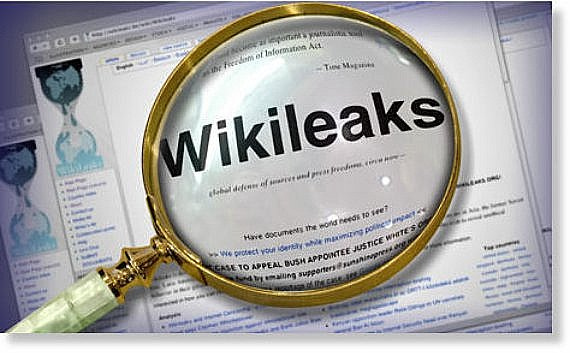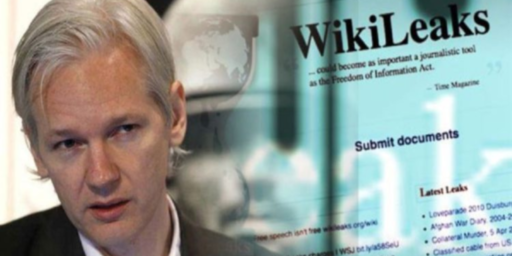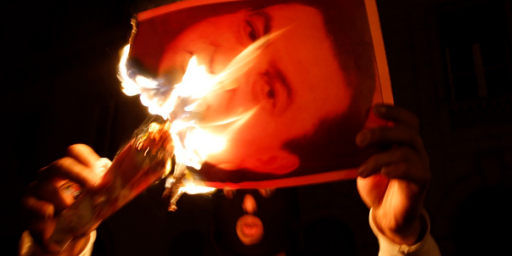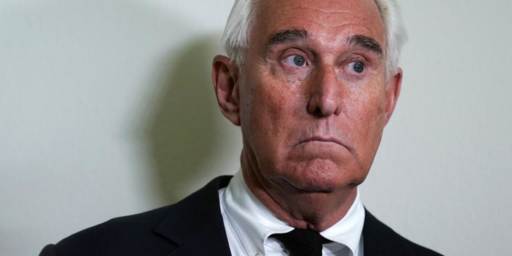Did Wikileaks Help Bring Down A Corrupt Arab Leader?
Information made public by Wikileaks appears to have played a role in sparking the protest movement that has brought down the President of Tunisia.
 It hasn’t received much coverage in the United States, but the ongoing protests in Tunisia have apparently brought an end to the Presidency of Zine el-Abidine Ben Ali, who took power via coup d’etat in 1987 and has governed the country ever since:
It hasn’t received much coverage in the United States, but the ongoing protests in Tunisia have apparently brought an end to the Presidency of Zine el-Abidine Ben Ali, who took power via coup d’etat in 1987 and has governed the country ever since:
TUNIS — President Zine el-Abidine Ben Ali of Tunisia has left the country amid growing chaos in the streets, French diplomats say, and the prime minister went on state television Friday night to say he is temporarily in charge.
A French Foreign Ministry official said authorities did not know where the president had gone, and representatives of the president were not immediately available to confirm the report.
There were also unconfirmed reports that the country’s airspace had been closed.
In his speech to the country, Prime Minister Mohamed Ghannouchi said that “as the president of the republic is unable to exercise his functions for the time being, I have assumed, starting now, the powers of the president.”
“I call on all sons and daughters of Tunisia,” the prime minister said, “to show the spirit of patriotism and unity in order to enable our country, which is dear to all of us, to overcome this difficult phase and restore its security and stability.”
The apparent fall of Mr. Ben Ali would mark the first time that widespread demonstrations had overthrown an Arab leader.
The prime minister’s announcement followed an extraordinary and fast-moving back-and-forth between the government and the protesters, who became increasingly emboldened over the last month of demonstrations. After the president tried to placate the protesters Thursday with promises of more freedom, including a right to demonstrate, tens of thousands rushed into the streets of downtown Tunis Friday to take advantage of his pledge by calling for his ouster
But when the protesters led a funeral procession for a recently killed protester through the streets, the police moved to disperse the crowds, brutally beating demonstrators and raining tear gas on the crowds who had gathered in front of the Interior Ministry. It is unclear if any demonstrators were shot Friday.
Mr. Ben Ali then announced that he had dismissed the Cabinet and would hold early elections, but news agencies said the government also declared a state of emergency forbidding new demonstrations and warning that those who disobeyed would be shot. There were reports of gunfire downtown in the capital early Friday night, The Associated Press reported.
Not being an expert on North Africa in general, or Tunisia in particular, I’m not going to comment on the internal situation in Tunisia, but I did find this account from one of the protesters to be very interesting in light of the issues we’ve had in the United States with Wikileaks:
The internet is blocked, and censored pages are referred to as pages “not found” – as if they had never existed. Schoolchildren are exchanging proxies and the word becomes cult: “You got a proxy that works?”
We all know that Leila has tried to sell a Tunisian island, that she wants to close the American school in Tunis to promote her own school – as I said, stories are circulating. Over the internet and under the desks, we exchange “La régente de Carthage” [a controversial book about the role of Leila Trabelsi and her family in Tunisia]. We love our country and we want things to change, but there is no organised movement: the tribe is willing, but the leader is missing.
The corruption, the bribes – we simply want to leave. We begin to apply to study in France, or Canada. It is cowardice, and we know it. Leaving the country to “the rest of them”. We go to France and forget, then come back for the holidays. Tunisia? It is the beaches of Sousse and Hammamet, the nightclubs and restaurants. A giant ClubMed.
And then, WikiLeaks reveals what everyone was whispering. And then, a young man immolates himself. And then, 20 Tunisians are killed in one day.
And for the first time, we see the opportunity to rebel, to take revenge on the “royal” family who has taken everything, to overturn the established order that has accompanied our youth. An educated youth, which is tired and ready to sacrifice all the symbols of the former autocratic Tunisia with a new revolution: the Jasmin Revolution – the true one.
This is one reason that I am not as reflexively anti-Wikileaks as some have been since the information they obtained from Pfc. Bradley Manning was made public. Exposing secrets can cause great harm, although there’s no evidence that any of the Wikileaks revelations in 2010 caused any real harm to American soldiers or American foreign policy, but it can also do great good when the government is using secrecy to hide the truth from the people. There’s a line of acceptable behavior, to be sure, but incidents like this should make clear that reflexively saying that Wikileaks is evil simply is not true.
H/T: Andrew Sullivan






This is exactly the role that journalism is supposed to play: Afflict the powerful, and raise hell. Something our media has lng since ceased to do.
Aren’t we getting ahead of ourselves in assuming this a good thing? Overthrowing a corrupt government frequently leads to an even worse one. I’m not saying this will definitely happen in Tunisia, but it’s quite possible.
I don’t go in for the logic of tolerating an evil for fear of a greater evil. That’s why I voted third party in the last election.
I’m not exactly saying we should “tolerate the evil”, just that we should wait and see what happens in Tunisia before we proclaim Wikileaks as a champion of democracy.
I don’t go in for the logic of tolerating an evil for fear of a greater evil.
So teaming up with Stalin to defeat the Axis powers was the wrong thing to do?
Yes, working with Stalin was the wrong thing to do.
Right-wing response:
It remains to be seen whether the events in Tunisia will have any repercussions in Egypt. Compared to Tunisia, Egypt is much larger, much more influential in regional affairs, and considerably poorer. Not to mention the fact that fundamentalists are much stronger in Egypt.
Doug- Corrupt and Arab Leader are redundant terms.
Steve
Exactly! Who wouldn’t want to visit New Stalingrad in what was once Glasgow!
@Steve “Corrupt and Arab Leader are redundant terms.”
That’s overstating things.
http://www.transparency.org/policy_research/surveys_indices/cpi/2010/results
Oman’s position on the list is fairly respectable, tied with Poland. Some others, such as Jordan, Saudi Arabia, and Kuwait, aren’t that far behind. They’re well ahead of such American allies as Greece, Brazil, Italy, and India.
I’m certainly not claiming that Arab nations as a whole look good on this scale. Some Arab states rate quite poorly, such as Syria, Lebanon, Sudan, and… err…. Iraq. On the heat map, you can see that the Arab area is fairly red, but so are a lot of other areas. The area to the north and west of China seems overall worse than the Arab states.
So it’s unfair to say that all Arab Leaders are especially corrupt when some do fairly decently.
“Yes, working with Stalin was the wrong thing to do.”
And your suggested alternative for defeating Hitler and winning World War II would be?
“Oman’s position on the list is fairly respectable, tied with Poland.”
Part of the problem is the big drop off once you leave the top level countries. #40 is further away from #1 than it is number 175 at the bottom. Beating Greece, which outright lied about its finances to its people, is setting the bar kind of low. To be fair, it is also tied up with poverty and war.
Steve
I haven’t lived in Tunisia since the early 80s, but governments there seem to come in two flavors: ineffectual effete or semi-effectual thugs. Ben Ali started out okay, but 20 years in office (following the custom of the country’s founder Habib Bourguiba) appears to have corrupted him thoroughly.
One of the hallmarks of Tunis is the ever-present Bureau de l’Ordre Public (BOP) who were always to be found just around the corner, a block behind the major avenues. Tunisians thought the acronym was particularly apt.
I’m with Joel on this one. Let’s see what happens before we applaud WikiLeaks here. Bringing down a government is the easy part–it can be done with a 30-cent bullet and we don’t applaud bullets, generally speaking.
Way early to conclude this is a good thing. remember how fun it was after the Iranians kicked the Shah out? It’s been nothing but fun ever since.
As for Ben Wolf: dude, I’m going to assume you’re young and idealistic, which is a lovely thing.
But you might want to bear in mind that the only reason we have a country is because we gained the support of Louis XVI who was not a noted democrat. Don’t believe the Minuteman, Paul Revere, George Washington story: Louis, his military advisors and especially his fleet are what allowed us to beat the British. In any comparison between George III and Louis XVI most people would credit George and Britain as the more enlightened regime. We were backed by the tyrant.
As long as MSM fails in it’s job, we need a Wikileaks.
Disunity among the Ummah is very dangerous and it may provide a murderous opportunity for the adversaries to add fuel to the fire.
After all, Ahmedinejad had not been a corrupt, incompetent or an immoral ruler. He has scored more than pass mark (I will give him a Merit Pass) There is no hard evidence to prove that last year’s election was a farce.
Try to go back to the earliest time of Islamic history when Khalifa Uthman ibn Affan (ra) was assassinated and when Ali ibn Abi Talib (ra) assumed the leadership of the nation of Islam.
The cunning Muawiyah and his group wanted the culprits, who planned and executed the assassination to be caught and punished as soon as possible, but Ali (ra) wanted to concentrate on the peace, unity and administration of the Ummah, but his adversaries were stubborn and had a political axe to grind. This led to the weakening and disintegration of the Nation of Islam. Did Islam gain by this sort of rationalistic freedom?
This is exactly what may happen in Iran if the followers of Mousavi pursued their selfishness and greed for political power. They may play into the hands of the enemies of Iran who have been waiting for a pretext and an opportunity to destabilize the nation and in the process help the ambitions of the greatest enemies of Islam
For the sake of saving the millions of innocent people of a Muslim nation, at times we have to forgive and forget the shortcomings of our leaders and rulers rather than trying to change the regime, create massive anarchy ( look at Afghanistan) by getting help from insincere and manipulating Non-Muslim world powers.
Iraq is right in front of our eyes. Tens of thousands of People like me hated Saddam Hussein and went to the extent of morally co-operating with his opponents and dissidents in seeking help to punish and execute Saddam and overthrow his administration (Remember Dr. Ahmed Chalabi and gang). What were the consequences?
But right now the same people feel the foolishness, naivety and immaturity of such political thinking and wish if only Saddam had remained in power and we could have saved the deaths of about 1.2 million Iraqis and about 400,000 people becoming refugees, over 600,000 widows and about 500,000 orphans and the nation going to the dogs. Who was responsible for this tragedy?
Case Two: Afghanistan: Islam was trying hard to destroy group loyalty and tribalism, but the people of Afghan gave importance to their tribes: Pushtu, Hazar, Tajik, Uzbeks, Turkmen, Kyrgyzs etc, and their leaders like Burhanuddin, Ahmed Mashod, Hikmatyar and others could have reconciled for the sake of the unity of the nation and Ummah but ego and greed for political power corrupted them and brought horrendous bloodshed, devastation and sufferings to the millions of innocent people and brought a shame to Islam in the world.
@steve: “Part of the problem is the big drop off once you leave the top level countries. #40 is further away from #1 than it is number 175 at the bottom.”
But it’s not further away from number 178 at the very bottom. Basically, #40 is about in the middle. So I wouldn’t call Oman particularly corrupt, given that it’s in the middle of the range of scores worldwide. Thus, I think it’s overstating things (not entirely wrong, just overstating) to say that all Arab leaders are corrupt.